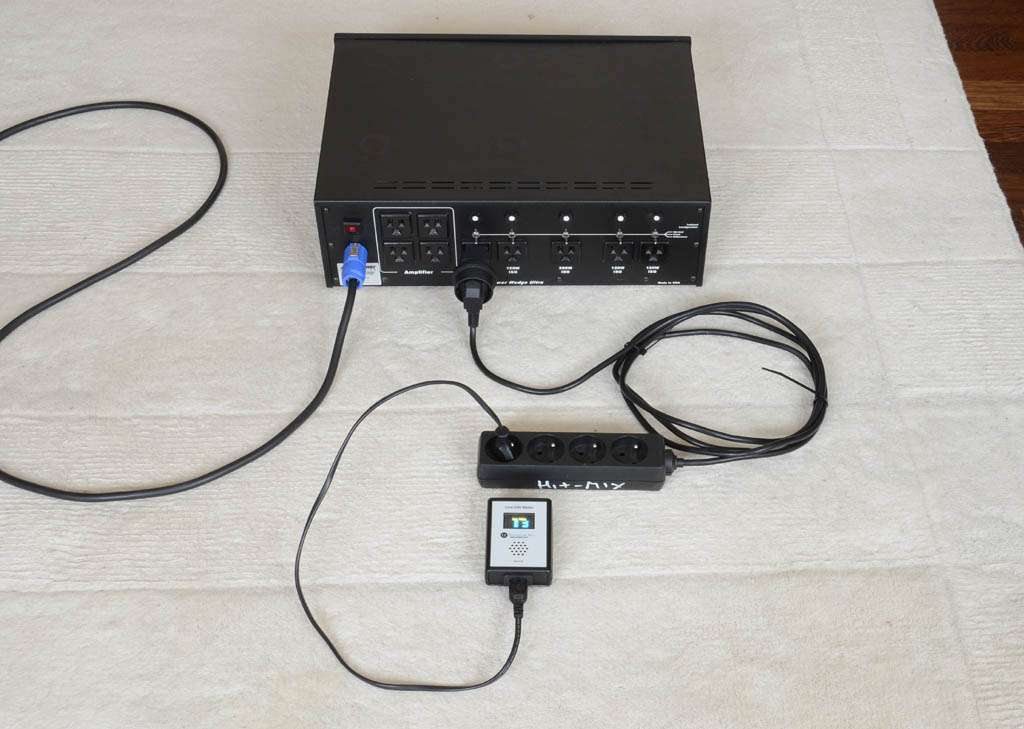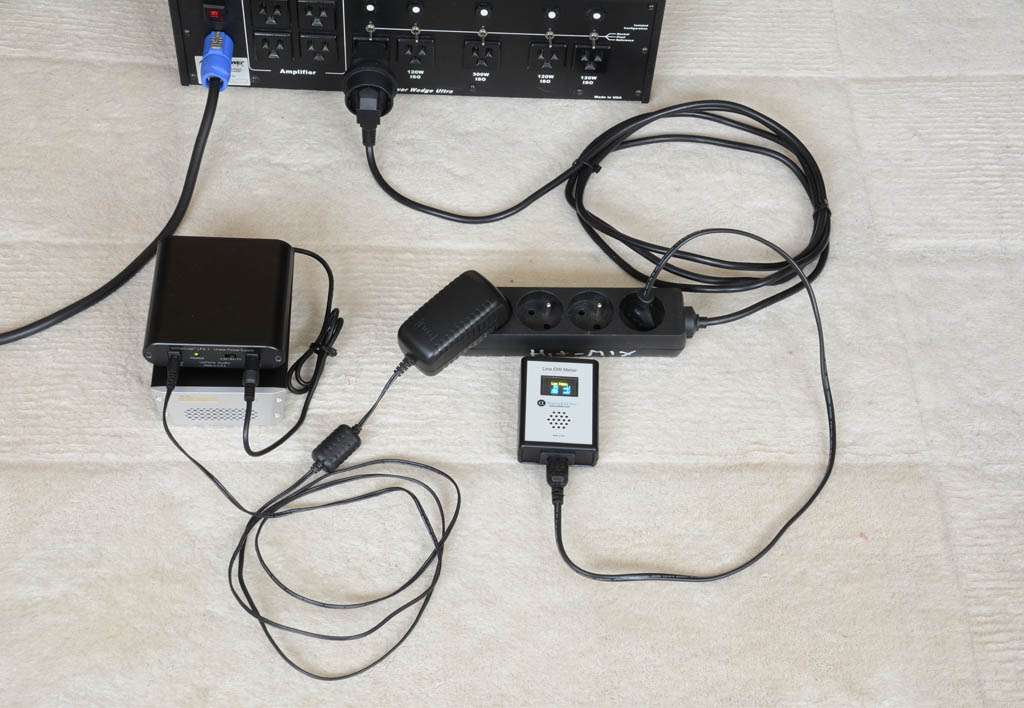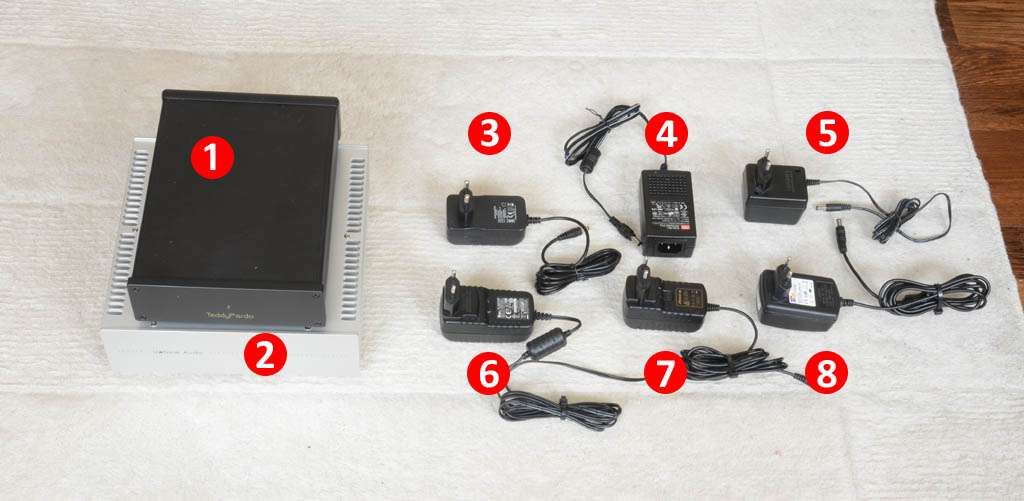Every PSU kicks some noise back into the AC line, which may have an influence on the rest of your gear connected to the same AC line.
I still remember a review written by Martin Colloms of some gear using onboard SMPS, where he claimed that simply connecting said component (otherwise not connected to the system) to AC line, made his system sound
considerably worse.
So how bad is the problem ? Having bought a wideband
AlphaLab EMI Power Line Noise Meter I decided check that out on various PSUs I had on hand.
The setup
To get a reference/base noise level I have used my old and trusty Audio Power Industries Power Wedge Ultra 215 power conditioner, which I normally use to 'sink' all of my computer related PSUs - main server PSU, SSD battery SMPS charger, UpTone Audio JS-2 powering two LPS-1 PSUs and a computer monitor.
The noise level measured at the output was just 23mV. I have used one of outputs to connect a simple power strip (with no filtering):

The PSU under test was connected to the same power strip, next to the EMI meter:

I had 8 different PSUs on hand: 3 linear ones and 5 SMPS (switch mode) types:

1. Teddy Pardo linear PSU
2. UpTone JS-2 linear PSU
3. SOtM supplied SMPS (PowerTek)
4. Meanwell SMPS (supplied by UpTone with Regen and LPS-1)
5. Some generic linear PSU I found lying around
6. Ktec SMPS that I got with an external HDD
7. iFi iPower SMPS
8 Co Ming Data SMPS
Since I have observed the level of noise beeing kicked back to the AC line varies with PSU load, I have measeured those PSUs in the following conditions:
1. Idle - PSU connected to the power strip, but nothing connected to the PSU (no load)
2. Noise under light load - PSU powering Regen, which in turn was powering AQ DragonFly DAC
3. Noise under moderate load - PSU powering SOtM sMS-200
4. Noise under heavy load - PSU powering the LPS-1 Ultracapacitor PSU, which in turn was powering the SOtM sMS-200.
The results I got are as follows (green = best case; red = worst case):
 Please note that the smallest, generic linear PSU (last column) was not tested with LPS-1, since its power rating was too small
Please note that the smallest, generic linear PSU (last column) was not tested with LPS-1, since its power rating was too small.
Some things I have noticed:
The SMPSu in general injected much more noise than linear ones. Even the cheapest generic wall wart linear PSU was better than the best SMPS.
In many cases, the noise figures dropped at idle a few mV below the reference level. It is my understanding that this is due to filtering built at the input of those PSUs, which interacts / lowers the noise on the AC line.
The PSU noise readings were jumping up and down when the LPS-1 PSU was connected (chence the results are in ranges). You can see this on a short video I uploaded on youtube.
It is my understanding that noise spikes were caused by the LPS-1 bulit in (capacitor) charger - when the charger was running, the noise was higher; when the charger was idling, the noise was lower. I'm not sure if higher noise readings are caused by higher current draw or the noise is comes from the LPS-1 charger itself. Whatever the reason - some PSUs were much more sensitive to that than the other.
For kicks, I have also measured several other PSUs and even light bulbs:

- iPhone, iPad and MacBook chargers are pretty harmless when at idle. I wouldn't want to have one connected to my powerstrip when charging though (all of you using MacBooks and other laptops connected to your system take note).
- CFL light bulbs (and LEDs) are huge noise generators (unlike regular light bulbs, which generate close to zero noise).
- chineese iPhone charger knock off from ebay, creates some absurd amounts of noise - many times more than the original Apple accessory (one more reason not to buy knock offs).
- TeraDak linear ATX PSU that powers my CAPS v4 Pipeline server generate generates only 48mV of noise - suprisingly litte.
Final notes:
If you have lots of those generic SMPS around your audio system (powering DACs, HUBs, routers, external HDDs etc), it probably makes sense to replace them with something designed with the AC noise pollution in mind, like the $49 iFi iPower SMPS for example. Linear still seems to work best though.
Having said that, please remember, that the best PSU is not necessarily the one which kicks the least amount of noise back into the AC line.
The best PSU is the one that has low AC noise footprint and offers stellar DC output performance.





